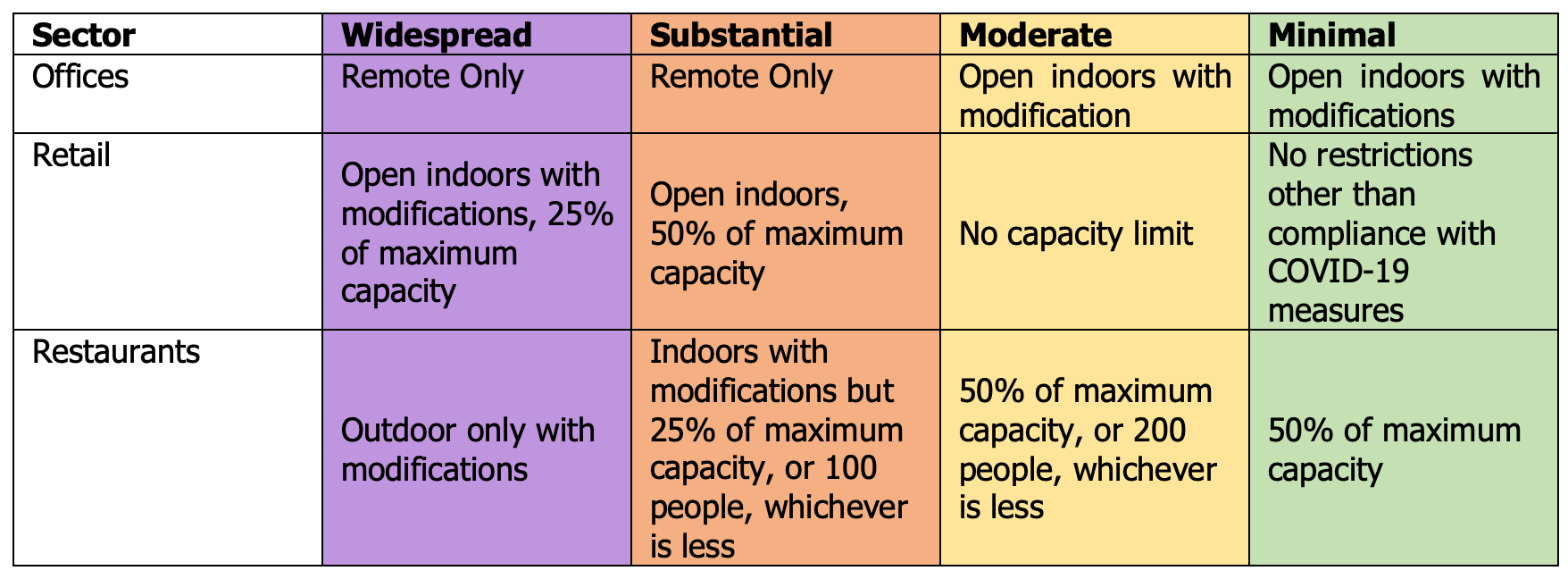Insights
California Pulls the "Emergency Brake" on Re-Opening
Nov 17, 2020Summary
In response to the 50% increase in COVID-19 cases over the prior week, Governor Gavin Newsom issued an order on November 16, 2020, that modifies California’s Blueprint for a Safer Economy. As a result, the majority of California counties have reverted to the strictest “Widespread,” or purple, re-opening tier effective immediately.
Counties Now in Widespread Tier:
The following counties have reverted to the Widespread tier effective as of November 16, 2020:
- Southern California: Kern, Orange, Santa Barbara, San Luis Obispo and Ventura Counties;
- Central California: Fresno, Kings, Merced, San Benito, San Joaquin, Santa Cruz, Stanislaus, and Tuolumne* Counties; and
- Northern California: Alameda*, Butte*, Contra Costa, El Dorado*, Glenn, Placer, Mendocino, Napa*, Nevada*, Santa Clara*, Siskiyou*, Solano, Sutter, Trinity*, Yolo and Yuba Counties.
*Denotes counties that dropped two or more tiers from the November 10, 2020 tier assignments.
What changes did the Governor make to the Blueprint for a Safer Economy?
Under the Governor’s November 16, 2020 order, the following changes have been made to the tier assignment process under the Blueprint for a Safer Economy:
- Tier assignments, which were previously released every Tuesday, may now occur any day of the week and may occur more than once a week.
- The changes in tier assignments will no longer be based on the 7-day trailing averages, but on the most recent reliable data as assessed by the California Department of Health.
- Counties may move back more than one tier if the California Department of Health determines that the data supports more intensive intervention.
- Any change in tier assignment will go into effect the day following such announcement.
What does this mean for California Businesses?
The table below provides a detailed description of how businesses are allowed to operate in each tier. Highlights include:
The new plan will have an immediate impact on businesses in many counties which had loosened restrictions on how businesses could operate, and are now in the Widespread tier.

What can California businesses do to continue operating and minimize their risk?
Businesses in California should determine what tier their county falls under, and evaluate whether they need to modify their operations in response to the restrictions in the new statewide plan. In addition, businesses should determine whether the counties where they operate have any additional restrictions, beyond what is included in the statewide plan.
Regardless of whether a business is modifying its operations, or continuing to operate, it should also (1) review the state’s Employer Playbook, (2) comply with the reopening guidance for its specific industry, (3) conduct a risk assessment, and develop a COVID-19 Response Plan for each worksite, retail location, office, or other place of business, (4) train employees, (5) implement screening, disinfection, and distancing protocols, (6) require face covering subject to certain exemptions, and (7) post a checklist of all of the above at its facilities.
We will continue to provide updates as the state clarifies and adds to the criteria and guidance under the new reopening plan. Should you have specific questions or like additional guidance to ensure compliance with the evolving re-opening requirements, please feel free to contact Tom Lee.
Related Capabilities
-
Regulation, Compliance & Advisory
-
Employment & Labor
-
Real Estate
-
Environment
-
Restaurants, Pubs & Clubs
-
Retail & Consumer Products
-
Hotels & Hospitality



